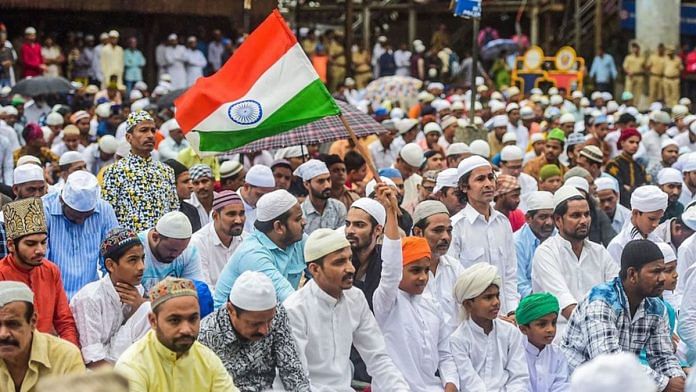The most interesting aspect of the current Uniform Civil Code debate is the debate itself. It has reached a level where we are left with only two choices: either support it for the sake of unity or oppose it in the name of diversity. In both cases, UCC is presented to us as a ‘Muslim issue’. This Muslim-centric portrayal is so rigid that we are forced to take a clear-cut position on a legal entity that does not even exist.
We should restrict our temptation to predict what ought to be the possible repercussions of UCC for Muslims; instead, we must try to understand the nature of the current debate and how a legal move is slowly and gradually transforming into a serious Muslim political anxiety.
The debate is an outcome of an invisible apparatus, which works very subtly. It blurs the boundaries between the complex legal status of UCC and Islamic religious practices. At the same time, it redefines the conventional binary between Sharia and UCC in an interesting manner. Thus, it is important to understand the three layers of this invisible apparatus to grasp the contemporary politics of UCC.
Also read: Question for UCC critics—Why don’t you want Sharia law for Muslim criminals?
The inner layer: blurring the boundaries
The 22nd Law Commission of India issued a notice with regard to UCC on 14 June 2023, a very delicately written legal text that solicited “views and ideas of the public at large and recognized religious organizations about the Uniform Civil Code”. This notice, in a way, generated a rather limited public discussion on this issue. The actual debate started immediately after Prime Minister Narendra Modi’s 27 June speech in Madhya Pradesh. In this speech, Modi, probably for the first time, established a direct link between the triple talaq ruling and the UCC.
These two episodes – the 22nd Law Commission’s notice and PM Modi’s speech – were seen in relation to each other. The print and electronic media began to publish articles, reports, and analyses in such a way that the distinction between legal process and political statement became virtually meaningless. The current impression is that the Law Commission has been directed to produce a legislation that will eventually tackle the social inequalities that arise by adhering to Sharia. This is actually the innermost layer of the apparatus where UCC is produced as a neat and clean Muslim political issue.
Also read: UCC could be around the corner, but divorce still comes in many colours in…
The middle layer: creating a new binary
At this stage, the All India Muslim Personal Law Board (AIMPLB) also entered the picture. The board, as expected, took advantage of the debate and decided to oppose the UCC rather interestingly. According to media reports, the board takes a slightly legalistic position on the issue, arguing that the implementation of “only one law in the name of UCC in a country like India, which consists of people belonging to multi-religions and cultures, is a violation of democratic rights”.
The Bharatiya Janata Party (BJP), on the other hand, takes a very intriguing, and, in a way, politically viable position. Instead of directly blaming Muslims for their religious backwardness or highlighting the Muslim Personal Law as a form of religious appeasement, the party approached identified sections of Muslims more directly. It organised consultations with Muslim women and Pasmanda communities in different states, projecting the UCC as a legal way to deal with social backwardness among Muslims.
A close reading of these two conflicting arguments by AIMPLB and BJP confirms how the middle layer of the apparatus functions. It not only confines the UCC debate to Muslims but also produces a new binary between religious rights and social justice.
Also read: Muslim clergy staunchly oppose UCC, but women’s organisations see chance to get ‘gender-just laws’
The outer layer: a new political divide
The Muslim-UCC connection has a long history, dating back to the mid-1950s when the Hindu code bills were passed. The Shah Bano controversy of the 1980s, and the more recent ban on triple talaq were other crucial moments where the UCC was defined in relation to Muslims. Yet, there is something specific about the current debate, which is actually related to the outermost layer of the apparatus.
Hindutva-driven nationalism is the dominant narrative of Indian politics today, and no political party is in a position to ignore it. The UCC, in this sense, cannot merely be seen as a political strategy of the BJP for the 2024 Lok Sabha election. It is an inseparable constituent of the Hindutva narrative, which goes well with the much-talked-about slogan, ‘one nation-one Constitution-one law’. Hindutva groups envisage Muslim identity as the only challenge to achieve this form of political homogenisation.
The opponents of UCC, especially the non-BJP parties, however, are a bit confused — they cannot deviate from the dominant narratives of politics. At the same time, they have to take a decisive and electorally viable position on UCC. They have found a unique way out. Instead of proposing any constructive resolution to a highly secular imperative like UCC, they have started addressing it eventually as a Muslim issue.
We do not know what kind of legislation the government plans to bring in. Nor do we have any idea about the future attitude of the Law Commission. Yet, it is clear that UCC will continue to survive as a Muslim issue even after 2024. After all, no one is interested in questioning the apparatus that produces ‘Muslim issues’ in our highly polarised public life.
Hilal Ahmed is a scholar of political Islam and associate professor at the Centre for the Study of Developing Societies (CSDS), New Delhi. He tweets @Ahmed1Hilal. Views are personal.
(Edited by Zoya Bhatti)



